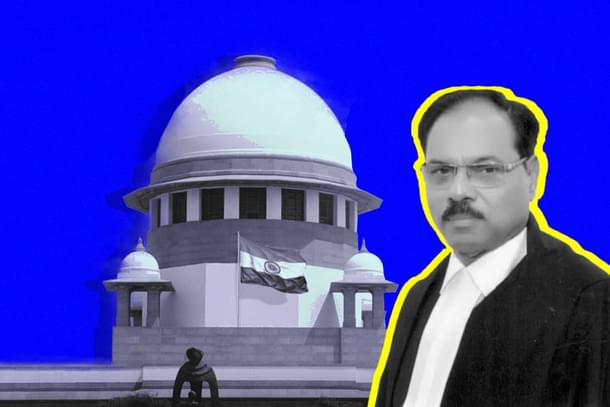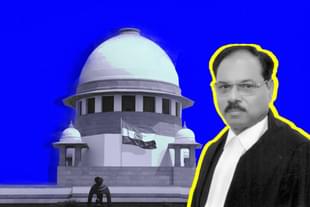Politics
Allahabad HC Judge ‘Summoned’ Over UCC Remarks: Is The Supreme Court Competent To Examine The Conduct Of High Court Judges?
Rudra
Dec 16, 2024, 03:42 PM | Updated 03:42 PM IST
Save & read from anywhere!
Bookmark stories for easy access on any device or the Swarajya app.


On 8 December 2024, Justice Shekhar Kumar Yadav of the Allahabad High Court attended an event organised by the Vishwa Hindu Parishad's legal cell on the topic of the 'Uniform Civil Code.' During the event, Justice Yadav made remarks that some have alleged were unbecoming of a judge.
Following the media uproar, the Supreme Court first called for ‘details and particulars’ of the event from the Allahabad High Court on 10 December 2024. Additionally, the Collegium of the Supreme Court summoned Justice Yadav to appear in person and explain his remarks.
Though the full lecture of Justice Yadav is not available in the press or elsewhere online, certain fragments of it have been widely circulated, leaving it to the audience to decide the nature of the speech. This article, however, focuses solely on the competence and authority of the Supreme Court to regulate the conduct of High Court judges.
It should be noted that the function of the Collegium of the Supreme Court, comprising the Chief Justice of India and the four senior-most judges, is limited to recommending the appointment and transfer of judges.
At the outset, it must be noted that High Courts are not subordinate to the Supreme Court. However, the Supreme Court is the highest appellate authority, and the law it declares is binding on all courts.
Additionally, it has the power to transfer cases between High Courts or to itself. This appellate power allows the Supreme Court to reverse, confirm, annul, or modify a High Court's decree. Furthermore, under Article 141 of the Constitution of India, the law declared by the Supreme Court is binding on all courts in India.
In light of the above, it is undisputed that, on the judicial side, the Supreme Court holds complete jurisdiction over the High Courts, and no High Court can challenge or interfere with the law declared by the Supreme Court.
However, on the administrative side, the Supreme Court has virtually no control over the judges of the High Court. The President of India has full authority to appoint, transfer, and determine the salary of High Court judges. While the power of appointment and transfer rests with the President, these actions are carried out based on the recommendations made by the Collegium of the Supreme Court.
Furthermore, in terms of Article 124(4) and (5) of the Constitution of India, a judge cannot be removed from his office except by an order of the president, passed in pursuance of the impeachment resolution passed by a ‘special majority’ of 2/3, after a thorough inquiry into the allegations against the judge.
The only grounds for the removal of a judge are proven misconduct or incapacity. Misconduct refers to behaviour that undermines the integrity and independence of a judge or the judiciary, such as corruption, sexual harassment, or financial misconduct.
Accordingly, it is amply clear that the Supreme Court is not the appointing authority of High Court judges, it cannot transfer High Court judges, it has no powers to fix the salaries of High Court judges, and the Supreme Court has no role to play in the removal of High Court judges.
Therefore, one needs to deliberate on the authority and competence of the Supreme Court to regulate the conduct of High Court judges. Has the Supreme Court, in the present matter, exceeded its jurisdiction by calling upon Justice Yadav to appear in person and explain his remarks?
As discussed earlier, any judge of the High Court derives their authority from the Constitution of India, and it may well be outside the competence of the Supreme Court to call upon a High Court judge to explain their conduct.
The criticism going around is that the Supreme Court's decision to summon Justice Yadav appears to be guided by the sudden media uproar and objections raised by certain senior advocates in the Hon'ble Supreme Court.
At the risk of repetition, while the President of India has the authority to appoint and transfer judges of the High Court, such appointments and transfers are made based on the recommendations of the Supreme Court Collegium. Regarding a permanent judge of the High Court, the only adverse action the Supreme Court Collegium can take is recommending their transfer to another High Court.
While the Supreme Court Collegium has the authority to recommend the transfer of a High Court judge, such a recommendation is only acted upon after due clearance by the central government and assent from Parliament.
In conclusion, if the Supreme Court recommends the transfer of Justice Yadav anytime soon, it will likely be criticised for irregularity and the whimsical nature of the Collegium’s recommendations.
If it is proven that Justice Yadav engaged in misconduct, his transfer to another High Court would serve no purpose. The correct course of action would be impeachment proceedings, provided that 'proven incapacity' or 'misconduct' is established against him.
The Supreme Court seems to have stepped into a matter duly vested with the Parliament.





